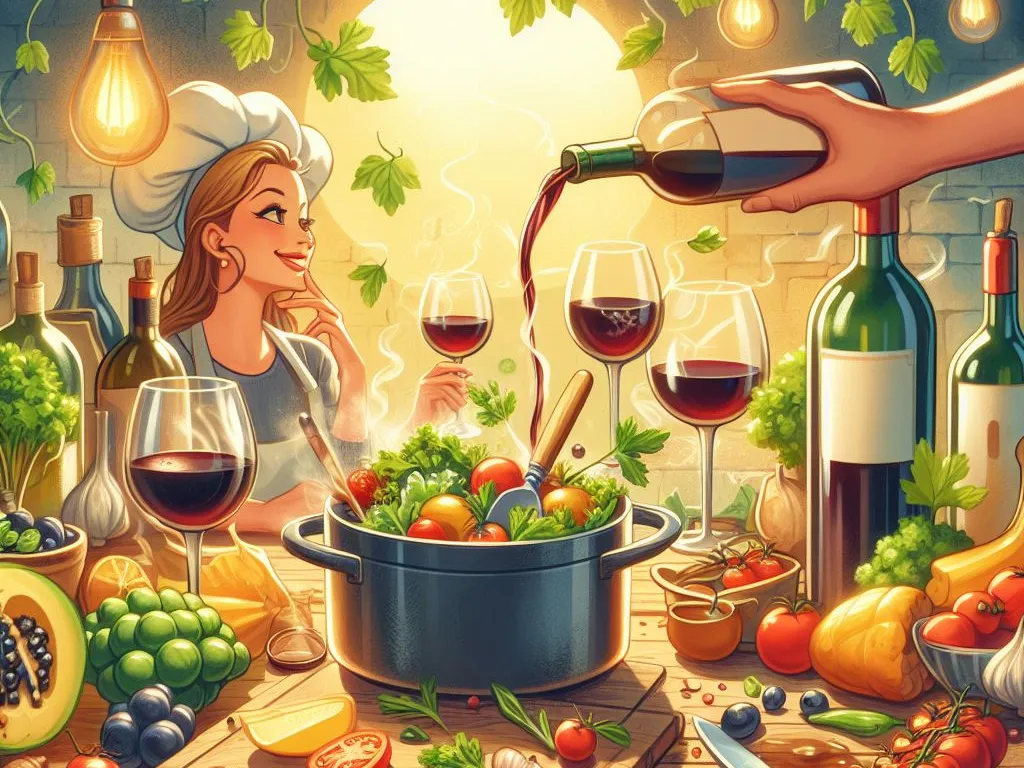Should the last drops of our best wines sacrifice their laughter? Check out their worth, a drop’s treasure in the heat of hereafter.

The prevailing belief today is that wine used for cooking should be of the standard we’d be willing to consume. While specific wine characteristics can influence the final dish, in most cases, these variations are relatively subtle or even negligible. It mostly comes down to how we perceive flavor through aromas and tastes.
An aroma is a volatilised chemical compound that humans or other animals perceive by the sense of olfaction (the sense of smell). While heat is not necessarily the enemy of aromas, since aromas require some heat to be released, but extensive exposure to heat, such that occurs during cooking, quickly decrease their presence through evaporation or decomposition leaving us mostly with our five tastes.
Despite the widely popular belief, cooking doesn’t eliminate a dish’s alcohol content.
Reduction
The presence of sugar significantly impacts the taste post-cooking, intensifying the sweetness through reduction which come quite close to syrupy consistency.
The fundamental guideline in wine selection for cooking focuses on sweetness.
- Use a sweet wine only if sweetness is intended in the dish; otherwise, opt for a dry variant. Most recipes usually specify the desired wine type, and it’s crucial to adhere to these guidelines to ensure the intended outcome aligns with the recipe’s vision.
- Acidity level of the whites plays an important role in their altered flavor post-cooking. Acidity notably intensifies during cooking, becoming the predominant characteristic post-cooking.
This doesn’t imply that all wine-based pan sauces inherently demand additional acid for flavor balance. The necessity largely hinges on the sauce’s constituents and proportions. However, it reaffirms the finding that a wine’s acidity, above almost all other elements (except for sugar), exerts the most substantial flavor impact.
Regarding pan sauces derived from red wines, their similarities are strikingly noticeable. It’s challenging to distinguish between the two red-wine-based sauces with the difference in acidity.
Braising

Traditionally, red Burgundy wine, crafted from Pinot Noir grapes, is the preferred choice for coq au vin. However, considering Burgundy’s hefty price tag, it’s often an impractical cooking option unless one can afford extravagance.
There’s validity to the guideline of cooking solely with wine one would consume, it doesn’t universally apply. While certain wines might not be fit for drinking due to aging or faults such as cork taint, heat damage, sulfur odors, vinegary acetic acid, oxidation, or solvent-like aromas, there are specific scenarios, such as braising where these wines could be acceptable for cooking purposes.
Fondue
Typically, splurging on expensive wine for cooking may not yield significant benefits: the intricate nuances tend to dissipate when subjected to cooking and are masked by other ingredients, rendering quality disparities less crucial.
Despite the common belief that tangy wines help emulsify cheese sauce better there is minimal flavor disparities between wines. Moreover, once integrated into the cheese sauce, it’s hard to discern any notable differences between the economical boxed-wine version and the expensive bottles. In most scenarios, investing in premium wine for cooking doesn’t seem justified, as the cooking process tends to blend away nuances, making quality distinctions less significant.
Cooking Guidelines with Wine
- Opt for dry wines when the recipe specifies
The residual sugar in off-dry wines significantly alters the dish’s flavor. - Avoid splurging on wine for cooking purposes
The defining flavors and aromas distinguishing one wine from another tend to diminish during cooking when combined with other ingredients. - Consider the wine’s acidity
Tangier wines result in tangier foods after cooking, which may suit some recipes while being less desirable in others. - Don’t excessively fret over oak and tannin
Although they can influence the final dish, their impact is usually overshadowed by a wine’s sugar and acidity. - Flawed wines can be great for cooking
The transformative power of cooking can salvage flawed wines, albeit not always guaranteed.
